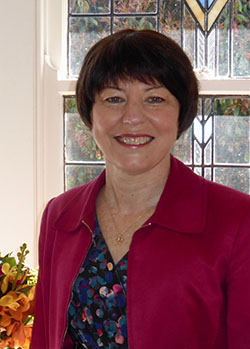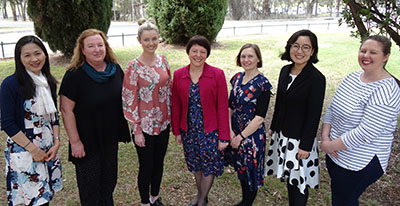* The Australian’s survey aimed to reveal Australia’s top researchers and research institutions
* CSU named a double leader in speech pathology research
* CSU researchers committed to make a difference to the lives of children and families
 Charles Sturt University (CSU) speech pathology researchers have received the double honour of being named ‘Australia’s Research Field Leaders’ in both the individual ‘Field Leader’ and ‘Leading Institution’ categories.
Charles Sturt University (CSU) speech pathology researchers have received the double honour of being named ‘Australia’s Research Field Leaders’ in both the individual ‘Field Leader’ and ‘Leading Institution’ categories.
The new edition of The Australian’s ‘Research’ magazine aimed to reveal in detail Australia’s top researchers and research institutions.
In the survey of Australia’s leading researchers, in the field category of ‘Audiology, Speech and Language Pathology’ The Australian newspaper named as ‘Field Leader’ CSU Professor of Speech and Language Acquisition Sharynne McLeod.
Professor McLeod (pictured left) is a researcher in the School of Teacher Education in Bathurst.
CSU also earned the acknowledgement of ‘Leading Institution’ in that field for the work of her team of researchers (named in Media Note at the end).
Professor McLeod said, “Our team are very grateful for this unexpected acknowledgement.
“Our dedicated team of researchers support children and adults with speech, language and communication needs, and encourage multilingualism in Australia. Our research facilitates everyone’s right to communicate and aligns with the United Nations’ Universal Declaration of Human Rights.”
“For every piece of research we do we ask, ‘will this make a difference to the lives of children and families across the world?’.”

“This is wonderful recognition of the way in which Charles Sturt University research contributes to ‘the public good’ in our regional communities and around the world,” Professor Vann said.
“I commend Professor McLeod and her team for their work to manifest the University’s ethos of Yindyamarra Winhanganha – ‘the wisdom of respectfully knowing how to live well in a world worth living in’.”
Acting Deputy Vice-Chancellor (Research, Development and Industry) Professor Heather Cavanagh said, “This is a fabulous achievement from a great team.
“It is a doubly exciting accolade because the University is named as both the field leader and the leading institution, whereas in many fields the institution is different from the field leader.”
Executive Dean of the CSU Faculty of Arts and Education Professor Lesley White added her congratulations, saying, “This is an outstanding achievement and a great accolade for Professor McLeod and her team. Well done to everyone.”
Team member Dr Suzanne Hopf, lecturer in speech pathology in the CSU School of Community Health, said being named ‘Institution Leader’ is an amazing recognition of the passion and commitment of this team to improving the lives of people with communication difficulties in communities around the world.
“I am incredibly proud to be a part of the CSU speech pathology team,” said Dr Hopf, who is based in Fiji where she conducts research.
“Sharynne’s vision of an international network of multidisciplinary researchers and clinicians willing to work together for a common purpose has changed the world in which we work.
“Our research team epitomises the benefits of collaboration and we happily rejoice in each other’s successes, large and small.
“But every great team needs a great leader and we are blessed to have Sharynne. She has an incredible ability to ‘sell’ our stories and research far and wide.
“Sharynne’s leadership has gifted us our connection, strength, and passion, and has connected us and elevated us all to research excellence.
“I am incredibly grateful to Sharynne, as are we all, for her compassionate and passionate leadership. The title of ‘Field Leader’ is justly given, and I congratulate her for it.”
The Australian’s report noted that Health and Medical Sciences is a particular area of strength for universities in Australia, where many institutions – including many outside of the research-intensive institutions, such as Charles Sturt University (in audiology, speech and language pathology) – do well, and are field leaders.
CSU was also named as ‘Leading Institution’ in two other categories:
Humanities, Arts and Literature
Australia’s Research Field Leaders: Field African Studies and History
Leading Institution: Charles Sturt University
Life Sciences and Earth Sciences
Australia’s Research Field Leaders: Field Birds
Leading Institution: Charles Sturt University





Social
Explore the world of social